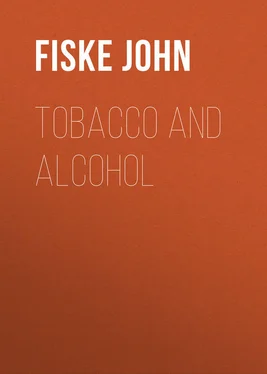John Fiske - Tobacco and Alcohol
Здесь есть возможность читать онлайн «John Fiske - Tobacco and Alcohol» — ознакомительный отрывок электронной книги совершенно бесплатно, а после прочтения отрывка купить полную версию. В некоторых случаях можно слушать аудио, скачать через торрент в формате fb2 и присутствует краткое содержание. Жанр: foreign_antique, foreign_prose, на английском языке. Описание произведения, (предисловие) а так же отзывы посетителей доступны на портале библиотеки ЛибКат.
- Название:Tobacco and Alcohol
- Автор:
- Жанр:
- Год:неизвестен
- ISBN:нет данных
- Рейтинг книги:4 / 5. Голосов: 1
-
Избранное:Добавить в избранное
- Отзывы:
-
Ваша оценка:
- 80
- 1
- 2
- 3
- 4
- 5
Tobacco and Alcohol: краткое содержание, описание и аннотация
Предлагаем к чтению аннотацию, описание, краткое содержание или предисловие (зависит от того, что написал сам автор книги «Tobacco and Alcohol»). Если вы не нашли необходимую информацию о книге — напишите в комментариях, мы постараемся отыскать её.
Tobacco and Alcohol — читать онлайн ознакомительный отрывок
Ниже представлен текст книги, разбитый по страницам. Система сохранения места последней прочитанной страницы, позволяет с удобством читать онлайн бесплатно книгу «Tobacco and Alcohol», без необходимости каждый раз заново искать на чём Вы остановились. Поставьте закладку, и сможете в любой момент перейти на страницу, на которой закончили чтение.
Интервал:
Закладка:
So much concerning narcotics has been established, with vast and profound learning, by Dr. Anstie. No doubt, by this time, the reader is beginning to rub his eyes and ask, Is this the way in which you are going to show that smoking is beneficial? You define tobacco as a poison which causes paralysis, and then assure us that it pays to smoke! It is true, this has at first sight a paradoxical look; but as the reader proceeds further, he will see that we are not indulging either in paradoxes or in sophisms. We wish him to take nothing for granted, but merely to follow attentively our exposition of the case. We have indeed called tobacco a poison, – and so it is, if taken in narcotic doses. We have accused it of producing paralysis, – and so it does, when taken in adequate narcotic doses. We would now call attention to a property of narcotics, which is well enough known to all physiologists, but is usually quite misapprehended or ignored by popular writers on alcohol and tobacco. 6 6 Mr. Lizars (On Tobacco , p. 54) has the impudence to cite Pereira (vol. ii. p. 1426) as an opponent of smoking, because he calls nicotine a deadly poison! And on p. 58 he similarly misrepresents Johnston. This is the way in which popular writers contrive to marshal an array of scientific authorities on their side. In the case of tobacco, however, it is difficult to find physiologists who will justify the popular clamour. They have a way of taking the opposite view; and when Mr. Lizars cannot get rid of them in any other way, he insinuates that all writings in favour of tobacco "have been got up from more than questionable motives." (p. 137.) This is in the richest vein of what, for want of a better word, we have called radicalism; and may be compared with Mr. Parton's belief that physicians recommend alcoholic drinks because they like to fatten on human suffering! ( Smoking and Drinking , p. 56.)
We allude to the fact that narcotics, when taken in certain small quantities, do not behave as narcotics, but as stimulants ; and that they will in such cases produce the exact reverse of a narcotic effect. Instead of lowering nutrition, they will raise it; instead of paralyzing, they will invigorate. Taken in a stimulant dose, tobacco is not only not a producer, it is an averter, of paralysis. It is not only not a poison, but it is a healthful, reparatory stimulus.
It is desirable that this point should be thoroughly understood before we advance a step farther. Here is the pons asinorum in the study of narcotics, but it must be crossed if we would get at the truth concerning alcohol and tobacco. Alcohol is a poison, says the teetotaler, who means well, but has not studied the human organism; alcohol is a poison, and once a poison always a poison. Nothing can seem more logical or reasonable, so long as one knows nothing about the subject. A quart of brandy is admitted to be poison; is not, therefore, a spoonful of brandy also poison? We reply, by no means. Physiological questions are not to be settled by formal logic. Here the quantity is the all-essential element to be taken into the account. Common salt, in large doses, is a virulent poison; in lesser doses it is a powerful emetic; in small doses it is a gentle stimulant, and an article of food absolutely essential to the maintenance of life. In the spirit of the teetotaler's logic, then, it may be asked, If a pound of salt is a poison, is not a grain of salt also a poison? We reply, call it what you please, you cannot support life without it. So from the poisonous character of the quart of brandy, the poisonous character of the spoonful is by no means a legitimate inference. The evil effects of the small dose are to be ascertained by experiment, not to be taken for granted. Logic is useful in the hands of those who understand the subject they reason about; but in other hands it sometimes leads to queer results. It was logic that used up the one-hoss shay.
The general principle to guide us here is that of Claude Bernard, that whatever substance or action, in due amount, tends to improve nutrition, may, in excessive amount, tend to damage nutrition. In the vast majority of cases the difference between food and poison, between beneficent and malignant action, is only a difference of quantity. Oxygen is the all-important stimulus, without which nutrition could not be carried on for a moment. It constitutes about one-fifth of our atmospheric air. Let us now step into an atmosphere of pure oxygen, and we shall speedily rue such a radical proceeding. We shall live so fast that waste will soon get ahead of repair, and our strength will be utterly exhausted. The effect of sunlight on the optic nerve is to stimulate the medulla, and increase thereby the vigor of the circulation. But too intense a glare produces blindness and dizziness. The carpenter's thumb, by friction against the tools he uses, becomes over-nourished and tough; but if the friction be too continuous, there is lowered nutrition and inflammation. Moderate exercise enlarges the muscles; exercise carried beyond the point of fatigue wastes them. The stale prize-fighter and the overworked farmer are, from a physical point of view, pitiable specimens of manhood. A due amount of rich food strengthens the system and renders it superior to disease; an excessive amount of rich food weakens the system, and opens the door for all manner of aches and ailments. A pinch of mustard, eaten with meat, stimulates the lining of the stomach, and probably aids digestion; but a mustard poultice lowers the vitality of any part to which it is applied. Moderate emotional excitement is a healthful stimulus, both to mind and body; but intense and prolonged excitement is liable to produce delirium, mania, or paralysis. Ne quid nimis , therefore, the maxim of the wise epicurean, is also the golden rule of hygiene. If you would keep a sound mind in a sound body, do not rush to extremes. Steer cautiously between Scylla and Charybdis, and do not get wrecked upon the one or swallowed up in the other.
Few persons who have not been specially educated in science have ever learned this great lesson of Materia Medica, "that everything depends on the size of the dose." It is not merely that a small dose will often produce effects differing in degree from those produced by a large dose; nor is it merely that the small dose will often produce an effect differing in kind from that of the large dose; but it is that the small dose will often produce effects diametrically opposite and antagonistic to those of the large dose. The small dose may even serve as a partial antidote to the large dose. The adage concerning the hair of the dog that has bitten us, embodies the empirical wisdom of our ancestors on this subject. Especially is this true of all the substances classed as narcotics. In doses of a certain size, they, one and all, produce effects exactly the reverse of narcotic. If anything is entitled to be called a deadly narcotic poison, it is strychnia, which, by paralyzing the spinal cord, induces tetanic convulsions: yet minute doses of strychnia have been used with signal success in the cure of hemiplegic paralysis. In teething children, the pressure upon the dental branches of the trigeminal nerve sometimes causes an irritation so great as partly to paralyze the medulla, inducing clonic convulsions, and perhaps death by interference with the heart's action. 7 7 Clendon, On the Causes of the Evils of Infant Dentition .
In these cases, alcohol has been frequently used with notable efficacy, averting as it does the paralysis of the medulla. Epileptic fits, choreic convulsions, and muscular spasms – such as colic, and spasmodic asthma – are also often relieved by the tonic or anti-paralytic action of alcohol. And how often has the temperate smoker, after some occasion of distressing excitement, his limbs and viscera trembling, his nerves "all unstrung," or incipiently paralyzed, – how often has the temperate smoker found his whole system soothed and quieted, and the steadiness of his nerves restored, by a single pipe of tobacco! That this is due to its action as a counteracter of paralysis is shown by the fact that tobacco has been successfully used in tetanus, 8 8 Curling, On Tetanus , p. 168; Earle, in Med. Chir. Trans. , vol. vi., p. 92; and O'Beirne, in Dublin Hospital Reports , vols. i. and ii.
in spasm of rima glottidis , 9 9 Wood, U. S. Dispensatory .
in spasmodic asthma, 10 10 Sigmond, in Lancet , vol. ii., p. 253.
and in epilepsy. 11 11 Currie, Med. Rep. , vol. i., p. 163.
For these phenomena physiology has but one explanation. They are due to the fact that narcotics, in small doses, either nourish, or facilitate the normal nutrition of the nervous system. They restore its equilibrium, enabling it, with diminished effort, to discharge its natural functions. And anything which performs this office is, in modern physiology, called a stimulant .
Интервал:
Закладка:
Похожие книги на «Tobacco and Alcohol»
Представляем Вашему вниманию похожие книги на «Tobacco and Alcohol» списком для выбора. Мы отобрали схожую по названию и смыслу литературу в надежде предоставить читателям больше вариантов отыскать новые, интересные, ещё непрочитанные произведения.
Обсуждение, отзывы о книге «Tobacco and Alcohol» и просто собственные мнения читателей. Оставьте ваши комментарии, напишите, что Вы думаете о произведении, его смысле или главных героях. Укажите что конкретно понравилось, а что нет, и почему Вы так считаете.












